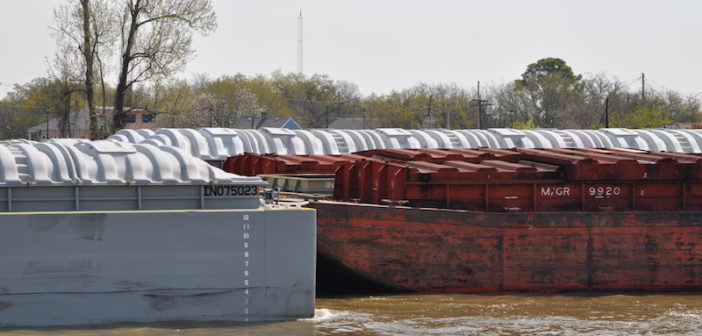Congress delivered a big win for inland waterways infrastructure this week when it agreed to change the cost-share arrangement for new lock and dam construction, but disappointed the maritime industry by refusing to give businesses liability protection from coronavirus-related lawsuits.
On Monday, both chambers passed the Water Resources Development Act of 2020 as part of a broader omnibus appropriations and Covid-19 relief funding package. That bill contains two important provisions for industries that depend on a strong inland waterways system and for U.S. ports.
One provision would shift more of the funding responsibility for new lock and dam construction to the federal treasury while requiring less from the Inland Waterways Trust Fund, which is financed by the barge industry through a diesel fuel tax. The current 50/50 formula would shift to 65% contribution from the Treasury and 35% from the trust fund. This change has been a top priority for waterways groups that say an adjustment would free up more money for waterways projects, many of which are underfunded, behind schedule or waiting to get started.
The new formula will run for 10 years and apply to the duration of projects that begin in this fiscal year through fiscal 2031.
“Particularly in a difficult Covid-19 environment, the passage of WRDA is a significant achievement for efficient modernization of the inland waterways system, potentially providing more than $1 billion in additional construction funds over 10 years that should help significantly reduce the backlog of authorized projects,” according to a statement from the Waterways Council Inc., which pushed for the change.
WRDA also included a cost-limit increase for Kentucky Lock and a Chief’s Report authorization for the Gulf Intracoastal Waterway – Brazos River Floodgates and Colorado locks, according to WCI. The cost-limit increase allows work on Kentucky Lock to continue to completion, and the Chief’s Report allows construction of new sector gates and channel widening to provide for more safe and efficient navigation, and also helps with water and sediment management capabilities on the Brazos River.
The appropriations bill that includes WRDA additionally funds the Army Corps of Engineers at $7.8 billion, up $145 million from the fiscal year 2020 level and $1.8 billion more than the Trump administration’s request. This budget would allow completion of the Chickamauga lock in Kentucky and efficient funds for the Kentucky Lock project, WCI said.
The bill also authorizes widening and deepening of the Houston Ship Channel, the busiest waterway in the country, and allows nine new study starts and seven total new construction starts for the Corps. The agency will release details on these projects within the next 60 days.
Of note is that the bill did not include user fees on the barge industry that had been proposed in the Trump budget request.
"Despite the many challenges of this year, WCI is very grateful that Congress passed WRDA 2020 with WCI’s top priority to adjust the construction cost-share, and provided strong FY21 funding for the Corps of Engineers. This is a win for the nation, our economy, and shippers and exporters,” said Tracy Zea, WCI president and CEO.
Another WRDA provision important to the nation’s ports would change the way funds are allocated and spent from the Harbor Maintenance Tax. Congress will allow the Fund to spend down an approximate $9.3 billion balance, starting at $500 million in the first year to address a backlog of federal navigation maintenance work throughout the country, according to the American Association of Port Authorities.
The HMT is collected on the value of imports, certain domestic cargo and on cruise ship passengers, and finances 100 percent of the operations and maintenance costs of federal navigational channels. But the program has historically taken in more revenue from shippers than Congress has appropriated to maintain harbors, an imbalance that has dismayed both small and large ports.
In a disappointment for the maritime industry, congressional leaders removed a liability protection against Covid-19 lawsuits that was holding up action on the $900 billion coronavirus relief package.
The protection was sought by the American Waterways Operators, which represents the tug and barge industry, as well as a long list of other industries nationwide that sought protection from what they feared would be frivolous lawsuits that could put many of them out of business. In the end, Senate Majority Leader Mitch McConnell, a key supporter of the liability shield, agreed to drop it, saying he’ll insist on including one in any Covid bill that emerges in 2021.
The waterways industry is ready to advocate for it next year. “AWO will continue to press for inclusion of liability protection in future legislation with the 117th Congress convenes in January,” said Jennifer Carpenter, president and CEO.
On a positive note, the Covid-19 package did include more money for the Paycheck Protection Program, which has been used by many maritime companies to keep their workers on the payroll during the pandemic.
The legislation is headed to the White House for the president’s signature, expected in the coming days.




